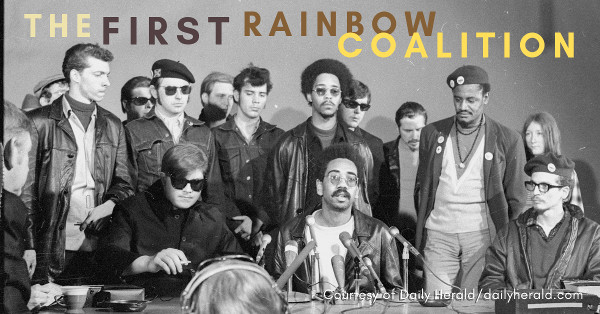Film review by James Tracy
Filmmaker Ray Santisteban’s new documentary, the First Rainbow Coalition, tackles the question of what it takes to build trust and solidarity between oppressed groups in a country atomized by racial capitalism. His cinematic eye is precise as he digs deep into the story of the alliance in the 1960s between the Illinois chapter of the Black Panther Party, the Puerto Rican Young Lords, and the poor white Young Patriots Organization.
This alliance was a living experiment in building left, multiracial unity while preserving the self-determination. Together these groups challenged police brutality and urban renewal, and built survival programs in Chicago neighborhoods.
Up until recently, this story was hidden in the footnotes of books about the Panthers and the 1960s. Books such as “From the Ballot to the Bullet,” (Jakobi Williams) and “Hillbilly Nationalists, Urban Race Rebels, and Black Power.” (Full disclosure: I was the co-author of that book with Amy Sonnie and also appear for twenty seconds in the film.)
Beautifully shot, the film weaves together substantial new interviews with Rainbow Coalition participants. Santisteban is a master of the interview which allows him to build a narrative based on the experiences of the people who built the coalition.
The film makes two major contributions to our understanding of this tendency: ample time to explore the under-explored Young Lords Organization, and a powerful exposition of state repression leading to the death of Panthers Fred Hampton and Mark Clark. Former Panther Ericka Huggins plays an essential role in setting much of the context of the history, helping the viewer to make sense of the fire and fury of the era. If there are any weaknesses in the film, it is only what was left on the cutting room floor. Few of the women who directly participated in the Rainbow Coalition are directly interviewed here. Some of the mentions of the forces that brought together the coalition are far too brief.
This film could not have come at a better time. With the racist far-right ascendant again (with a friend in the White House), the story of the Rainbow Coalition contains the threat of a good example. The fact that it existed, even briefly, gives evidence that with patient organizing and alliance building, racism can be challenged and open up a political space for new possibilities.
The First Rainbow Coalition
Latest
The People’s Tribune opens its pages to voices of the movement for change. Our articles are written by individuals or organizations, along with our own reporting. Bylined articles reflect the views of the authors. Articles entitled “From the Editors” reflect the views of the editorial board. Please credit the source when sharing: peoplestribune.org. Please donate to help us keep bringing you voices of the movement for change. Click here. We’re all volunteer, no paid staff. The People’s Tribune is a 501C4 organization.

